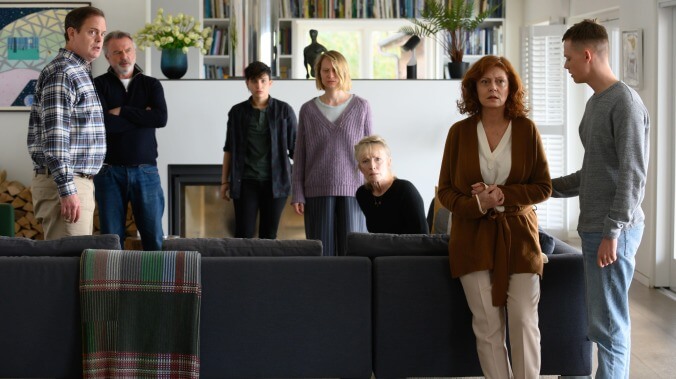Susan Sarandon, Kate Winslet, and Mia Wasikowska can’t enliven the end-of-life drama Blackbird
Film Reviews Blackbird
Note: The writer of this review watched Blackbird from home on a digital screener. Before making the decision to see it—or any other film—in a movie theater, please consider the health risks involved. Here’s an interview on the matter with scientific experts.
Movies that unblinkingly confront the mechanics and minutiae of death enter into an unspoken contract with the audience: As compensation for accessing feelings of existential or practical despair over the potential nothingness that awaits us all, the movie in question will offer some kind of insight into human behavior. It doesn’t have to be comforting or cathartic, but just killing a couple of hours won’t cut it. The death’s-door family drama Blackbird breaks this contract slowly and tastefully, but breaks it all the same.
The movie is a remake of the 2014 Danish film Silent Heart, but has the modest scope of a stage play. It takes place over the course of a weekend where Lily (Susan Sarandon), who is dying of amyotrophic lateral sclerosis, has gathered her immediate family to her home for a few days of togetherness—at the end of which she will be euthanized by her doctor husband, Paul (Sam Neill). This is not a dark family secret; the event has been planned out well in advance, though that doesn’t stop the usual close-family grousing. Older daughter Jennifer (Kate Winslet) is irritated yet unsurprised that her younger sister Anna (Mia Wasikowska) arrives late, and with her on-and-off partner Chris (Bex Taylor-Klaus) in tow. Jennifer and her husband Michael (Rainn Wilson) try to shield their teenage son Jonathan (Anson Boon) from the specifics of his grandmother’s plan, but Lily, being of the same cutesy, iconoclastic vintage as many other later-period Susan Sarandon characters, feels perfectly comfortable discussing her fate matter-of-factly. She even makes irreverent remarks about how she’ll be dead in a few days. The movie reiterates again and again: She really does go there.
Thankfully, Blackbird isn’t all savoring good wine and Lily making repeated jokes about how Jonathan should spend his inheritance on “hookers and blow.” Director Roger Michell, a versatile journeyman with an occasional weakness for twinkly uplift, imposes a surprisingly rigorous shooting style on this material. The camera rarely moves, and he doesn’t give his actors many close-ups; he seems to prefer shots that can capture a full room, with as many of the characters positioned within the frame as possible. It’s a way of placing the audience in the environment without relying on handheld clichés, and there’s a theatrical quality to the way his compositions call attention to entrances and exits, even when they happen casually.
The movie’s central conflicts also feel stagy, especially in the second half, when one sister decides she’s not sure if she can bear to let her mom go after all, and the other sister grows increasingly suspicious of family friend Liz (Lindsay Duncan). The dialogue from screenwriter Christian Torpe—adapting his Silent Heart script—does a credible job evoking the awkward tension of guests stuck together waiting out an emotionally fraught time, but when the characters have it out with each other, nearly every exchange sounds unmistakably written, as if working from a checklist of characterizations and backstory. It’s rough watching the actors muddle through: Wasikowska’s Anna, the designated feckless/troubled younger daughter, tosses off non mot insults like “Mr. Boring” and “Martha fucking Stewart” (timely!), while poor Winslet has to telegraph uptight, control-freak scolding—the familiar traits that uncreative indie movies often assign to fortysomething actresses to show what total moms they are.
The late-movie second-guessing of Lily’s decision could have provided real tension, especially because it follows some low-key observational scenes where her family appears accepting of physician-assisted suicide. But as superficially sad as the story is willing to get, Blackbird would rather stir up melodrama than produce something genuinely confrontational. With its quasi-literary tone and over-calculated concessions to the messiness of real life, the movie settles for coming across like a clumsy amalgamation of the wonderful Amy Bloom short story “Love Is Not A Pie” and the 1998 Sarandon tearjerker Stepmom. The hollow, unsatisfying feeling the movie leaves behind may be the most authentically funereal thing about it.
6 Comments
from the files of John Candy/Mariel Hemingway we have: RAINN WILSON/KATE WINSLETNot quite as bad as Tilda Swinton/John C. Reilly but worse than Jodie Foster/John C. Reilly
I saw this movie last year at TIFF. I liked it more than you did but disliked the storyline at the end with the family friend. Unnecessarily melodramatic and also didn’t make much sense? I thought the cast was very good though and there were touching and funny moments.
I’m down for watching Susan-fucking-Sarandon being euthanized. Remember 4 years ago when she claimed there was no difference between former Secretary of State Clinton and former reality TV actor Trump?
Yeah, people who have voted Democratic for decades suddenly defected to Trump or stayed home because Susan Sarandon told them to.Clinton was a bad candidate who ran a bad campaign. Susan Sarandon did not cost her the election.
Normally, I would watch Lindsay Duncan do damn near anything, but this sounds gross.
That’s Really Fantastic!!!